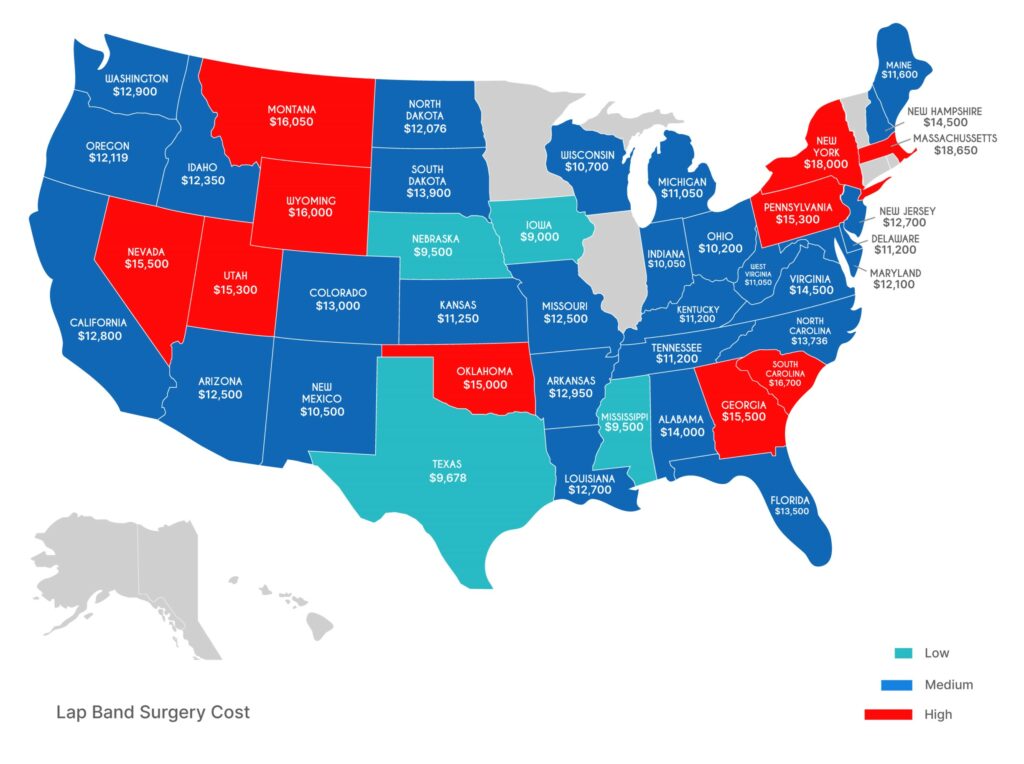
Laparoscopic Adjustable Gastric Band Surgery, popularly known as lap-band surgery, is a minimally invasive, and reversible procedure. It involves placing a silicon band around the digestive system (i.e., upper stomach) for weight loss, which you may not be able to achieve otherwise with exercise.
According to GoodRx Health, the bariatric surgery procedure can cost anywhere from $7,400 to over $33,000, depending on the severity. However, the average lap band surgery cost is around $14,600 for uninsured patients in most states across the U.S.
Curious About Liposuction?
Understand the Cost and Various Methods to Pay for It
Naturally, the cost might be your top concern if you are looking for low-risk surgical weight loss options. In this blog, we’ll answer your cost-related questions, like “How much is lap-band surgery?" and “How much does lap-band surgery cost with insurance?". We will also discuss the cost of lap band surgery without insurance, and potential payment options.
How Much Is Lap Band Surgery: Overall Cost Breakdown
The average cost of a lap-band surgery ranges between $9,000 to $18,000. However, many factors are involved in determining the estimated average cost. Below is an overview for your reference:
| Factors | Approximate cost range |
|---|---|
| Consultation fee | $50 to $200 |
| Associated costs (i.e., nutrition counseling, psychological evaluation, and follow-up visits) | $350 to $750+ per session |
| Anesthesia costs | $1,000 to $2,000+ |
| Surgeon’s fee | $3,000 to $6,000+ |
| Hospital stay | $10,000 to $20,000+ |
| Pre-op lab tests and X-rays | $200 to $400+ |
| Total cost | $14,600 to $29,350+ |
| **These are the estimated costs updated on December 2023 and are subject to change. It is recommended to consult a licensed surgeon for an accurate estimate. | |
Additionally, after the surgery, patients may also require future adjustments, corrections, or lap band removal after a few years.
Breakdown Of Lap Band Surgery Before And After Costs
To help you plan your finances, here is what you can expect to pay before and after the procedure:
| Factors | Estimated Cost Before Surgery | Estimated Cost After Surgery |
|---|---|---|
| Surgeon's Fee | $3,000 - $6,000+ | - |
| Facility Fee (including hospital stay) | Can be charged before or after, as per the clinic’s policies | $10,000 - $20,000+ |
| Anesthesia | $500 - $2,000+ | - |
| Pre-operative Care | $500 - $2,000 | - |
| Post-operative Care | $1,000 - $3,000 | Can be charged before or after, as per the clinic’s policies |
| Additional Tests/Consultations | $500 - $1,500 | $500 - $1,500+ |
| Nutrition Counseling | $100 - $400 per session | $100 - $400 per session |
| Total Estimated Cost | $5,600 - $14,900 | $10,600 - $21,900+ |
Average Lap Band Surgery Cost Breakdown By State

| State | Lap Band Surgery Cost Range (lowest to highest) | Average cost |
|---|---|---|
| Washington | $7,000 - $20,000 | $12,900 |
| Oregon | $7,500 - $29,400 | $12,119 |
| Nevada | $10,000 - $17,000 | $15,500 |
| West Texas | $9,000 - $18,000, | $13,500 |
| Arizona | $7,100 - $19,400 | $12,500 |
| Utah | $5,600 - $16,720 | $15,300 |
| Idaho | $5,200 - $14,300 | $12,350 |
| Montana | $5,500-$21,100 | $16,050 |
| Massachusetts | $8,600 - $24,400 | $18,650 |
| Wyoming | $5,200 - $26,800 | $16,000 |
| Colorado | $6,000 - $20,000 | $13,000 |
| New Mexico | $5,400 - $14,700 | $10,500 |
| Texas | $6,900 - $19,700 | $9,678 |
| Oklahoma | $11,000 - $18,650 | $15,000 |
| Kansas | $6,000 - $16,500 | $11,250 |
| South Dakota | $7,500 - $20,300 | $13,900 |
| Minnesota | $7,500 - $20,500 | $12,076 |
| Missouri | $6500 - $18,500 | $12,500 |
| Arkansas | $8,100 - $15,800 | $12,950 |
| Louisiana | $5,700 - $15,400 | $12,700 |
| Alabama | $8,000 - $20,000 | $14,000 |
| Tennessee | $6,100 - $17,400 | $11,200 |
| Wisconsin | $6,100 - $15,300 | $10,700 |
| Ohio | $9,400 - $23,400 | $10,200 |
| Michigan | $5,800 - $16,500 | $11,050 |
| Mississippi | $7,400 - $13,200 | $9,500 |
| Georgia | $9,600 - $26,300 | $15,500 |
| California | $7,900 - $21,600 | $12,800 |
| Florida | $6,100 - $17,400 | $13,500 |
| North Carolina | $5,500 - $22,000 | $13,736 |
| South Carolina | $8,100 - $25,300 | $16,700 |
| Virginia | $6,100 - $17,400 | $14,500 |
| West Virginia | $5,000 - $13,100 | $11,050 |
| Kentucky | $5,800 - $16000 | $11,200 |
| Indiana | $5,500 - $13600 | $10,050 |
| Pennsylvania | $7,500 - $22,000 | $15,300 |
| New York | $8,500 - $29,000 | $18,000 |
| New Jersey | $5,200 - $16,100 | $12,700 |
| Maine | $6,100 - $17,000 | $11,600 |
| Iowa | $5,500 - $15,000 | $9,000 |
| Delaware | $7,000 - $19,200 | $11,200 |
| Maryland | $6,600 - $19,000 | $12,100 |
| New Hampshire | $8,800 - $24,100 | $14,500 |
| Nebraska | $6,000 - $16,100 | $9,500 |
Does Insurance Cover The Cost Of Lap-Band Surgery?
This treatment is generally recommended for patients who struggle with obesity. Hence, when deemed “medically necessary," the insurance may cover the full cost or provide partial coverage, depending on the plan you may have. So, you may need to incur some out-of-pocket expenses based on the extent of the coverage.
To qualify for the insurance claim, you must fulfill certain criteria, which may vary according to the state and specifics of your insurance plan. The general criteria include the following:
- Age - Patient must be 18 - 21+ (varies by state)
- Body Mass Index (BMI) - It must be 40 or above (i.e., to be considered obese)
- Severity - The seriousness of the health complications directly related to weight is also crucial in determining eligibility.
- Sufficient Efforts To Lose Weight - The patient must have made efforts for weight loss, i.e., completed the other medically supervised weight-loss treatments recommended by the doctor.
- Psychological Evaluation - The patient also needs approval from a board-certified psychiatric expert.
- Medical History And Lifestyle Changes - Insurance companies also consider medical history and require patients to make lifestyle changes, i.e., diet changes, following a fitness regimen, avoiding smoking, etc.
Most insurance plans may cover the lap-band cost for patients in the moderate and morbidly obese categories. However, patients who don’t qualify for insurance coverage may need to explore other options.
How Much Does Lap-Band Surgery Cost Without Insurance?
Uninsured patients can expect to pay somewhere between $14,000 to over $30,000 on average. So, if medical insurance is not an option for you, you might want to look into third-party financing or flexible payment plans to pay for the procedure.
Other Payment Options To Afford The Lap-Band Cost
A. Medicaid
It is a state and federal government-backed program that offers health coverage for low-income individuals and families. It provides coverage for a range of bariatric surgeries, including lap-band. To qualify for Medicaid, you must be below the specified income limit, which varies by state, and also fulfill other requirements.
B. Flexible Payment Plans
If you don’t qualify for insurance or Medicaid, you can explore payment plan options. For instance, many providers nowadays offer no credit check payment plans with Denefits. It’s an affordable way to pay for a range of healthcare services in monthly installments. The process is quick, with instant approvals and a higher approval rate than traditional lenders.
It is recommended to consult with your surgeon about your payment preferences during your first consultation for a smooth payment experience.
C. Medical Credit Cards
These can help finance a wide range of treatments, including bariatric surgeries. Your eligibility heavily depends on your credit standing, so it’s ideal for patients with a good credit score (i.e., 640 or above). So, if you qualify, you can pay for lap-band surgery with CareCredit or other medical credit cards.
| Pro tip: Make sure to read all the terms and conditions carefully, especially the interest rates and repayment terms. Also, it’s crucial that you pay without any defaults, or it may negatively affect your credit scores. |
|---|
Final Thoughts
Lap-band surgery is an effective and minimally invasive surgical weight-loss option to fight against obesity. However, it’s crucial to do your research about the associated costs and explore your payment options to ensure your finances don’t stand in the way of your health and well-being.
Insurance is undoubtedly the best option to pay for lap-band cost, but if that isn’t viable for you, there are various other options. Flexible payment plans (from providers who use Denefits) stand out as an excellent option as no credit check is required, and they can fit any budget. So, make sure to consult with a provider that can meet your payment needs.
FAQs: Answering The Most Commonly Asked Queries On Lap-Band Surgery Cost
1. What Does The Cost Of Lap-Band Surgery Include?
It usually includes the surgeon’s fee, pre-op tests, hospital charges, follow-up care, and counseling appointments. Hence, researching the lap band surgery before and after costs in your state can provide valuable insights and help you make an informed decision.
2. How Much Coverage Does Insurance Provide?
If the lap-band procedure qualifies as medically necessary, insurance may cover the cost partially or entirely, depending on the plan.
3. What’s The Lowest Cost For A Lap-Band Surgery?
On the lower end, a lap-band procedure can cost around $6000, excluding other associated costs. However, the average cost, including pre-op tests, nutrition counseling, and other associated costs, can range between $8,000 to $15,000. The cost can vary significantly based on several other factors, such as location, medical facility, surgeon’s experience, and additional tests (if needed).
It's crucial to remember that the surgeon’s experience, post-op care, and facility play a crucial role in a smooth recovery after a successful lap band surgery. Hence, it is recommended to consult with an experienced specialist who can provide comprehensive care as well as offer flexible payment options.
4. What Is The Qualifying Criteria For Getting A Medical Card?
Many people use medical cards, such as CareCredit, to pay for medical procedures. To qualify, you need a credit score of 640 or above as well as meet the financial assessment requirements. A good credit score can help you get a higher credit limit on your medical card.
5. What Are The Eligibility Requirements To Apply For Denefits Payment Plans?
Denefits has a ‘No Credit Check’ policy with an approval rate as high as 95%. You can discuss your payment preferences with your surgeon and ask if they offer Denefits payment plans. It is an inclusive option for patients, especially those who have slightly poor scores.



